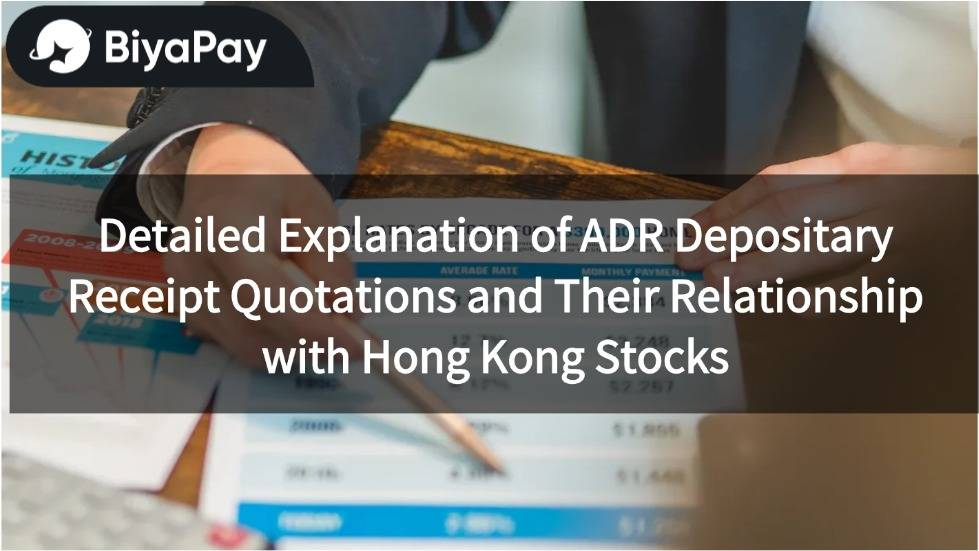- EasyCard
- Trade
- Help
- Announcement
- Academy
- SWIFT Code
- Iban Number
- Referral
- Customer Service
- Blog
- Creator
Detailed Explanation of ADR Depositary Receipt Quotations and Their Relationship with Hong Kong Stocks

Image Source: pexels
Depositary receipt quotations often show a linkage with Hong Kong stock prices. When Hong Kong stocks like Tencent or HSBC Holdings experience price changes in the Hong Kong market, their American Depositary Receipts (ADR) quotations reflect proportional changes. Fluctuations in the USD to HKD exchange rate also impact ADR quotations. For example, recently, HSBC Holdings’ ADR was 0.48 USD higher than its Hong Kong stock, and China Mobile was 0.92 USD higher, indicating a close linkage between the two markets’ prices. Investors can use USD to directly participate in Hong Kong stock investments, and in the market structure, U.S. institutional and retail investors account for a significant proportion, further enhancing ADR market liquidity.
Key Points
- ADR prices are closely linked to Hong Kong stock prices, with exchange rates, time differences, and market news affecting price changes in both.
- ADRs allow investors to participate in Hong Kong stock investments using USD without opening a Hong Kong securities account, increasing asset allocation flexibility.
- Different types of ADRs have varying trading venues and information transparency; investors should choose based on their risk tolerance.
- Short-term price differences may occur between ADRs and Hong Kong stocks, and investors can exploit arbitrage opportunities but must consider transaction costs and risks.
- Investing in ADRs requires attention to exchange rate fluctuations, liquidity, and regulatory risks; it’s recommended to regularly monitor related announcements and consult professional advice.
ADR Quotations and Hong Kong Stock Prices

Image Source: pexels
Price Linkage
There is a clear linkage between ADR quotations and Hong Kong stock prices. When stocks like Tencent Holdings or Alibaba experience price fluctuations in the Hong Kong market, the related ADR quotations adjust based on the actual conversion ratio and exchange rate. This linkage is not an isolated case but a common phenomenon across multiple global markets. According to a study on 23 emerging markets and 4 developed markets, price synchronization between markets is particularly evident in emerging markets. The study notes that market size, political and economic instability, and historical volatility affect the degree of price linkage. Prices across different markets show synchronized fluctuations over different holding periods (e.g., one week, one month), reflecting the close connection between ADR quotations and Hong Kong stock prices.
Taking Tencent as an example, after the Hong Kong market closes, Tencent’s ADR in the U.S. market will quote based on the Hong Kong closing price, the HKD to USD exchange rate, and the conversion ratio. If significant news emerges at the opening of the Hong Kong market the next day, the ADR price may reflect market expectations in advance. This linkage mechanism allows investors to participate in Hong Kong stock investments across time zones, enhancing asset allocation flexibility.
Influencing Factors
Several factors influence the degree of linkage between ADR quotations and Hong Kong stock prices:
- Exchange Rate Fluctuations
ADR quotations are priced in USD, while Hong Kong stocks are priced in HKD. Exchange rate changes directly affect the conversion between the two markets’ prices. For example, if the HKD to USD exchange rate fluctuates, even if the Hong Kong stock price remains unchanged, the ADR quotation will adjust accordingly. - Time Difference Effect
There is a time difference between the Hong Kong and U.S. markets. When the Hong Kong market is closed, the U.S. market continues trading, and ADR quotations may reflect potential changes based on global news and U.S. investor sentiment. This time difference effect sometimes causes short-term price deviations, but as both markets open, prices gradually align. - Liquidity Differences
The liquidity of the ADR market is influenced by U.S. investor participation. If an ADR has active trading, its price linkage with Hong Kong stocks is stronger. Conversely, ADRs with lower liquidity may exhibit larger price gaps. - Market News and Policy Changes
Major policies, company announcements, or international events simultaneously affect Hong Kong stocks and ADR quotations. For example, Alibaba, listed in both the U.S. and Hong Kong, will see rapid price reflections in both markets if it releases quarterly earnings.
Professional Tip: Investors should closely monitor exchange rate trends and market opening times in both regions and pay attention to short-term deviations between ADR quotations and Hong Kong stock prices to seize potential arbitrage opportunities.
In summary, the linkage between ADR quotations and Hong Kong stock prices is influenced by multiple factors. Investors can assess the reasonableness of prices in both markets by observing exchange rates, time differences, and liquidity changes, making more informed investment decisions.
ADR Basics
Definition and Structure
American Depositary Receipts (ADRs) are securities traded in the U.S. financial market. They represent ownership of shares in an overseas company listed in the U.S. When investors buy ADRs, they hold depositary receipts issued by U.S. banks rather than directly owning the original company’s stocks. This structure allows U.S. and global investors to participate in overseas markets like Hong Kong stocks using USD without opening a Hong Kong securities account.
The operation of ADRs works as follows:
- Overseas companies deposit their shares with a designated Hong Kong bank or international custodian bank.
- A U.S. bank issues ADRs based on these shares, which are listed on U.S. exchanges.
- Each ADR can represent one share, multiple shares, or a fraction of a share, determined by the issuance agreement.
Professional Tip: ADR quotations adjust based on the original stock price, exchange rate, and conversion ratio; investors should monitor related announcements.
Issuance Types
ADRs are divided into three main types based on issuance method and compliance level:
- Level 1 ADR
These ADRs are traded only in the over-the-counter (OTC) market. Companies are not required to submit detailed financial reports to the U.S. Securities and Exchange Commission (SEC). Liquidity is low, and information transparency is limited. - Level 2 ADR
These ADRs can be listed on major U.S. exchanges (e.g., NYSE or NASDAQ). Companies must comply with some SEC disclosure requirements, offering relatively higher transparency. - Level 3 ADR
These ADRs allow companies to publicly issue new shares in the U.S. and list on exchanges. Companies must fully comply with SEC financial disclosure and regulatory requirements, offering the highest liquidity and transparency.
| Type | Trading Venue | Disclosure Requirements | Liquidity |
|---|---|---|---|
| Level 1 ADR | Over-the-Counter (OTC) | Low | Low |
| Level 2 ADR | Exchange | Medium | Medium |
| Level 3 ADR | Exchange | High | High |
Different types of ADRs suit investors with varying risk tolerances. Choose based on your needs and requirements for information transparency.
Price Differences and Arbitrage

Image Source: pexels
Reasons for Differences
Although ADR and Hong Kong stock prices tend to align over the long term, short-term differences still occur. Goldman Sachs analyzed 30 dual-listed Chinese stocks, finding that conversion mechanisms are effective, and prices in both markets are generally close to parity over time. However, some companies experience premiums or discounts due to liquidity, exchange rate fluctuations, or market sentiment. The table below shows the premium percentages of some ADRs compared to their original stocks (including Hong Kong stocks):
| Stock Name | ADR Premium Percentage |
|---|---|
| TSMC | Approximately 27.55% |
| UMC | Approximately 5.06% |
| Chunghwa Telecom | Approximately 2.80% |
These data reflect varying price difference percentages among companies. Although ADR quotations are generally synchronized with Hong Kong stock prices, short-term differences may arise due to exchange rates, liquidity, and market news.
Arbitrage Opportunities
When significant price differences occur between ADRs and Hong Kong stocks, market participants seek arbitrage opportunities. Arbitrage typically involves buying in the lower-priced market and selling in the higher-priced market to profit from the price gap. The following scenarios often present arbitrage opportunities:
- High-frequency arbitrage in the warrant market indicates that arbitrage opportunities are common.
- Near the expiration of warrants or during initial listings, arbitrage net returns and frequency are higher.
- Market price fluctuations do not equal those of the underlying common stock, creating short-term arbitrage opportunities.
- Professional investors leverage equipment and software advantages to instantly capture and execute arbitrage operations.
However, arbitrage is not without risks. Investors must consider transaction costs, exchange rate fluctuations, liquidity risks, and short-selling repayment risks. During mandatory repayment periods, arbitrage operations become more challenging. Retail investors face higher barriers due to information and technology limitations. Professional investors can enhance arbitrage efficiency through automated trading programs.
Professional Tip: While arbitrage opportunities exist, carefully evaluate related risks and costs, and avoid blindly chasing short-term price differences.
Investment Risks
Exchange Rate Risk
When investing in ADRs, investors must face exchange rate fluctuations between USD and HKD. When the HKD to USD exchange rate changes, the USD price of an ADR may adjust significantly even if the original stock price remains unchanged. For example, if the HKD depreciates, investors may incur losses when converting back to USD. Exchange rate risk directly affects final returns, especially during periods of significant market volatility.
Liquidity Risk
Liquidity risk refers to the possibility that investors may not be able to buy or sell ADRs at the desired price due to insufficient market trading volume. Some ADRs have low trading volumes in the U.S. market, leading to wider bid-ask spreads. In such cases, investors may face additional costs or difficulty in closing positions immediately. Liquidity risk is particularly significant for retail investors.
Other Risks
In addition to exchange rate and liquidity risks, investing in ADRs involves multiple potential risks:
- Corporate Governance Risk: Some overseas companies have varying standards for information disclosure and internal controls, making it difficult for investors to fully understand the company’s condition.
- Tax Differences: Different countries have varying tax policies for ADRs, and investors may face double taxation. It’s recommended to review the latest regulations from Hong Kong banks and U.S. tax authorities.
- Regulatory Risk: Differences in regulatory standards between the U.S. and Hong Kong may result in ADRs facing delisting risks if companies fail to meet SEC requirements.
Note: Investors should regularly review ADR quotations and related announcements and consult professional advisors to mitigate potential risks.
Investors should thoroughly understand the linkage between ADR quotations and Hong Kong stock prices. Market volatility and exchange rate changes affect final returns. It’s recommended to review information from Hong Kong banks or professional institutions and carefully assess your risk tolerance. Wise choices can enhance asset allocation efficiency.
FAQ
Why do short-term price differences occur between ADRs and Hong Kong stocks?
Market time differences, exchange rate fluctuations, and varying liquidity cause short-term deviations between ADR and Hong Kong stock prices. Professional investors closely monitor these factors and adjust strategies promptly.
Do you need a Hong Kong securities account to invest in ADRs?
Investors do not need a Hong Kong securities account. They can buy and sell ADRs through U.S. brokers, trading directly in USD, making it convenient to participate in Hong Kong stock investments.
How do you check the ADR conversion ratio?
Investors can check the conversion ratio between ADRs and original stocks on the issuing bank’s or exchange’s official website. Ratios vary by company, so monitor announcements and related details.
Are there tax risks with ADR investments?
ADR investments involve U.S. and Chinese tax policies. Investors should review information from Hong Kong banks and U.S. tax authorities to understand potential double taxation risks.
Can retail investors participate in arbitrage when price differences occur between Hong Kong stocks and ADRs?
Retail investors can participate in arbitrage but must consider transaction costs, exchange rate fluctuations, and liquidity risks. Professional investors typically have faster information and trading tools, making arbitrage more efficient.
In 2025, ADR and Hong Kong stock prices are closely linked, but exchange rate volatility and high fees (USD 2–3) can erode returns. BiyaPay optimizes your investments with a single account for seamless ADR and Hong Kong stock trading, eliminating multi-platform complexity. Complete HKD-to-USD conversion at the real - time market exchange rate, beating bank charges. Real-time rates minimize exchange losses, supporting HKD, USD, and crypto conversions. BiyaPay’s 5.48% annualized return product outperforms traditional ADR investments.
Compliance-registered as FSP (New Zealand) and MSB (the US), regulated by regulatory authorities of both regions, it ensures security. Set up in minutes to seize arbitrage and investment opportunities. Join BiyaPay now to boost your returns! Sign up today to grow your wealth in 2025!
*This article is provided for general information purposes and does not constitute legal, tax or other professional advice from BiyaPay or its subsidiaries and its affiliates, and it is not intended as a substitute for obtaining advice from a financial advisor or any other professional.
We make no representations, warranties or warranties, express or implied, as to the accuracy, completeness or timeliness of the contents of this publication.




Contact Us
Company and Team
BiyaPay Products
Customer Services
is a broker-dealer registered with the U.S. Securities and Exchange Commission (SEC) (No.: 802-127417), member of the Financial Industry Regulatory Authority (FINRA) (CRD: 325027), member of the Securities Investor Protection Corporation (SIPC), and regulated by FINRA and SEC.
registered with the US Financial Crimes Enforcement Network (FinCEN), as a Money Services Business (MSB), registration number: 31000218637349, and regulated by FinCEN.
registered as Financial Service Provider (FSP number: FSP1007221) in New Zealand, and is a member of the Financial Dispute Resolution Scheme, a New Zealand independent dispute resolution service provider.




















